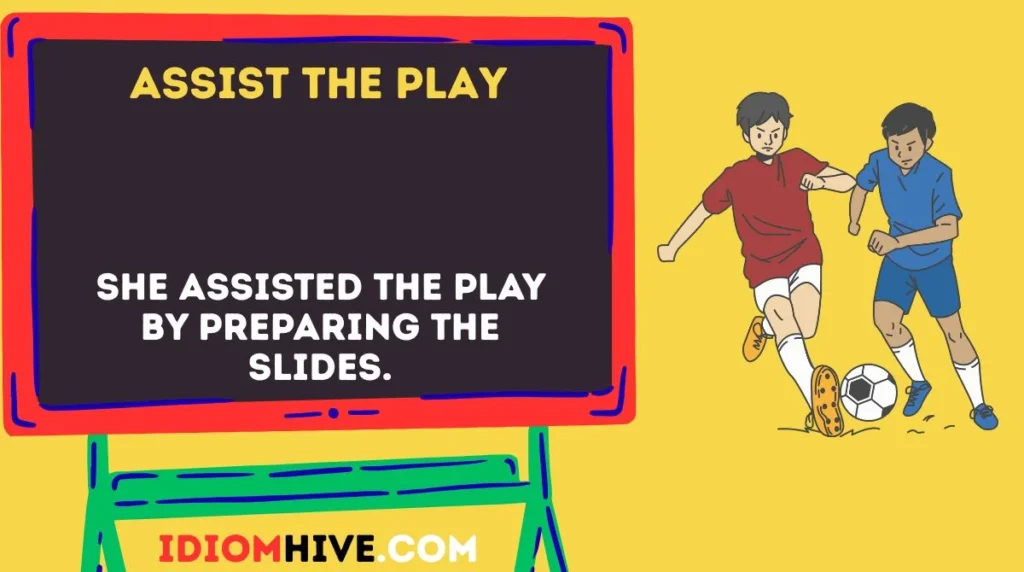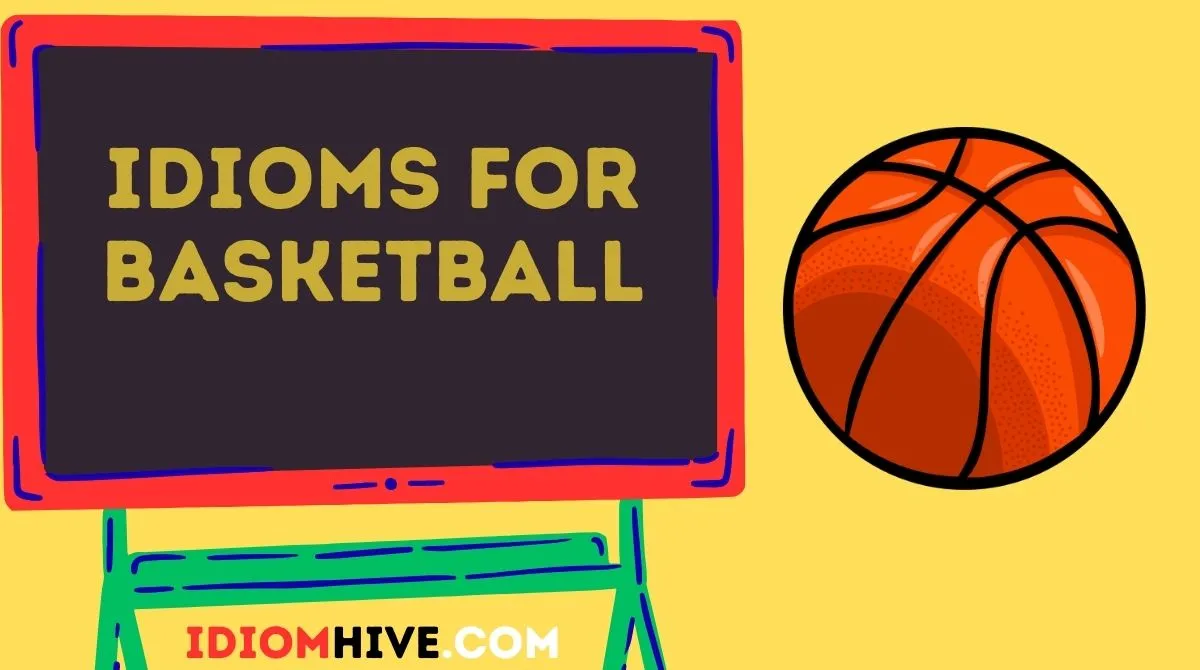Basketball is more than just a game. It’s fast, energetic, and full of clever plays. That’s why so many English idioms come from basketball.
But wait—what’s an idiom? An idiom is a phrase or expression that doesn’t mean exactly what the words say.
Instead, it has a special meaning that people understand through common use. For example, “shoot your shot” doesn’t mean you are playing basketball—it means you’re trying your best or taking a chance.
Learning basketball idioms can help you sound more natural in English. These phrases are often used in daily conversations, movies, business meetings, and even in motivational speeches. Whether you love basketball or not, these idioms are great tools to improve your vocabulary and communication.
So, let’s dive in and explore how basketball has influenced the English language in a fun and exciting way!
🏀 Did You Know?
Many basketball idioms became popular thanks to American sports commentators in the 20th century. These catchy phrases spread beyond the court into everyday English. Today, people use them in business, education, and relationships—even if they’ve never dribbled a ball!
Basketball Idioms About Trying and Taking Action
These idioms talk about effort, taking chances, and being brave—just like in a real game!
Shoot Your Shot
Meaning: Take a chance or try something, even if it’s risky.
Example: I know she might say no, but I’m going to shoot my shot and ask her out.
Similar Idiom: Go for it
Note: Informal; often used in personal life or motivation.
Take the Shot
Meaning: Make an attempt or decision.
Example: When the opportunity came, he took the shot and started his own business.
Similar Idiom: Seize the moment
Note: Common in both casual and business talk.
Full-Court Press
Meaning: A strong and determined effort to achieve something.
Example: They used a full-court press to win the deal with the client.
Similar Idiom: All-out effort
Note: Often used in business or strategy discussions.
Step Up to the Line
Meaning: Be brave and take responsibility or action.
Example: It’s time to step up to the line and lead the team.
Similar Idiom: Rise to the occasion
Note: Can be formal or informal.
Make a Fast Break
Meaning: Move quickly to take advantage of a chance.
Example: She made a fast break and applied for the job before it closed.
Similar Idiom: Jump at the chance
Note: Energetic tone, used in daily life.
Go Hard in the Paint
Meaning: Put in full effort, especially when things are tough.
Example: He went hard in the paint to finish the project on time.
Similar Idiom: Give it your all
Note: Informal; often motivational.
Dribble It Out
Meaning: Waste time or avoid taking action.
Example: Stop dribbling it out and make a decision already!
Similar Idiom: Beat around the bush
Note: Casual tone, often in friendly or frustrated talk.
Put the Ball in Motion
Meaning: Start a process or begin something.
Example: We need to put the ball in motion for the new marketing plan.
Similar Idiom: Get the ball rolling
Note: Used in both business and casual talk.
Basketball Idioms About Success and Winning
These idioms celebrate victory, achievement, and smart moves—just like scoring in basketball!
Slam Dunk
Meaning: A guaranteed success.
Example: Her presentation was a slam dunk.
Similar Idiom: Sure thing
Note: Very popular in all kinds of conversations.
Hit a Three-Pointer
Meaning: Achieve something big or impressive.
Example: Landing that deal was like hitting a three-pointer at the buzzer.
Similar Idiom: Score big
Note: Energetic and exciting tone.
Nothing but Net
Meaning: A perfect result or flawless success.
Example: His answer in the interview was nothing but net.
Similar Idiom: Nailed it
Note: Informal; fun and positive.
Win by a Mile
Meaning: Win easily or with a big advantage.
Example: They won by a mile in the sales contest.
Similar Idiom: Win hands down
Note: Common in competitive settings.
Above the Rim
Meaning: Performing at a high level or being excellent.
Example: His skills are really above the rim.
Similar Idiom: Top-notch
Note: Used in sports and performance contexts.
Stay in the Game

Meaning: Keep trying or not give up.
Example: Even after two rejections, she stayed in the game.
Similar Idiom: Hang in there
Note: Encouraging and supportive tone.
Keep the Streak Alive
Meaning: Continue being successful.
Example: Let’s keep the streak alive and win again this quarter.
Similar Idiom: Maintain the momentum
Note: Often used in business or team talk.
In the Zone
Meaning: Fully focused and performing well.
Example: She’s in the zone today—look at that productivity!
Similar Idiom: On fire
Note: Used in sports, work, and creativity.
Basketball Idioms About Pressure and Challenges
These idioms describe tough moments, big decisions, and stressful situations.
Buzzer Beater
Meaning: Doing something just in time.
Example: He submitted the report like a buzzer beater—seconds before the deadline.
Similar Idiom: Last-minute
Note: Informal but vivid.
Crunch Time
Meaning: A critical or high-pressure moment.
Example: It’s crunch time before the product launch.
Similar Idiom: Do-or-die moment
Note: Common in school, work, and sports.
On the Bench
Meaning: Not active or not participating.
Example: I’ve been on the bench while others are leading the project.
Similar Idiom: Sit out
Note: Casual; can be used at work or in life.
Drop the Ball
Meaning: Make a mistake or fail to do something important.
Example: I really dropped the ball by forgetting that email.
Similar Idiom: Mess up
Note: Common in informal and professional speech.
Call a Timeout
Meaning: Pause or take a break.
Example: Let’s call a timeout and rethink our strategy.
Similar Idiom: Take a breather
Note: Useful in group discussions or problem-solving.
Play Defense
Meaning: Be careful or protect your position.
Example: They played defense by cutting costs during the crisis.
Similar Idiom: Play it safe
Note: Often used in business or planning.
Foul Play
Meaning: Dishonest or unfair action.
Example: The manager suspected foul play in the bidding process.
Similar Idiom: Something fishy
Note: Can be used in formal or informal talk.
Double Team
Meaning: Two people working together to stop or challenge someone.
Example: They double-teamed him with tough questions during the interview.
Similar Idiom: Gang up on
Note: Can be humorous or serious depending on tone.
Basketball Idioms About Teamwork and Strategy
These idioms highlight cooperation, planning, and working as a group—the heart of basketball and real life!
Team Player
Meaning: Someone who works well with others.
Example: She’s a real team player—always helping out.
Similar Idiom: Supportive colleague
Note: Very common in work and school.
Pass the Ball
Meaning: Let someone else take the lead or responsibility.
Example: He passed the ball to his teammate during the meeting.
Similar Idiom: Hand it over
Note: Casual but professional-friendly.
Assist the Play

Meaning: Help someone succeed.
Example: She assisted the play by preparing the slides.
Similar Idiom: Lend a hand
Note: Positive and polite tone.
Set a Screen
Meaning: Help someone by blocking or removing obstacles.
Example: He set a screen for his coworker by managing the schedule.
Similar Idiom: Clear the way
Note: Creative and metaphorical.
Call the Play
Meaning: Make the decision or lead the plan.
Example: As the manager, she called the play on the next steps.
Similar Idiom: Take charge
Note: Often used in leadership or teamwork.
Run the Court
Meaning: Be in control or take the lead confidently.
Example: He ran the court during the presentation.
Similar Idiom: Own the room
Note: Informal, confident tone.
Bench Strength
Meaning: The hidden talent or backup team members.
Example: Our company has strong bench strength in marketing.
Similar Idiom: Depth of team
Note: Often used in business or sports management.
Switch Positions
Meaning: Change roles or responsibilities.
Example: Let’s switch positions to try a different approach.
Similar Idiom: Change gears
Note: Useful in team planning and learning.
How to Use These Idioms in Daily Life
You don’t need to be a basketball fan to use these idioms! Here’s how you can include them in your everyday English:
- Speaking: Use them in casual chats, interviews, or team meetings. For example, “Let’s call a timeout and think” sounds more natural than just saying “Let’s stop.”
- Writing: Spice up your emails, essays, or reports. Try saying “Our campaign was a slam dunk” instead of “It was successful.”
- Professional Use: Many of these idioms fit perfectly in business, leadership, and motivation. They show confidence and creativity in communication.
Common Mistakes Learners Make With Idioms
Using idioms is fun, but watch out for these common errors:
- ❌ He slam dunked the job interview.
✅ The job interview was a slam dunk.
🔍 Idioms often have fixed forms. Don’t change their structure unless you’re sure. - ❌ She drop the ball yesterday.
✅ She dropped the ball yesterday.
🔍 Always use the correct verb tense with idioms. - ❌ I was in the zone on my chair.
✅ I was in the zone while working.
🔍 Make sure the idiom fits the situation naturally.
Frequently Asked Questions
Q1: Can I use basketball idioms even if I don’t watch basketball?
Yes! These idioms are used widely in English, even by people who don’t follow the sport. They’ve become part of everyday language.
Q2: Are basketball idioms formal or informal?
Most are informal or semi-formal, but many can be used in professional settings like presentations, emails, or team discussions.
Q3: How can I remember these idioms easily?
Try using them in sentences, practice with a friend, or make flashcards. The more you use them, the easier they stick.
Q4: Do people use these idioms outside the USA?
Yes. While they started in American English, they are now common in many English-speaking countries, especially in media and global business.
Q5: What’s the difference between a basketball idiom and a metaphor?
An idiom is a fixed phrase with a special meaning. A metaphor compares things directly but is more flexible. Some idioms are also metaphors!
Conclusion
Basketball idioms bring action, color, and energy into the English language. From “shoot your shot” to “slam dunk,” these phrases help you sound confident, creative, and natural.
Whether you’re chatting with friends, writing an email, or giving a speech, these idioms will help you express yourself in a smarter and more exciting way. Keep practicing, stay in the game, and soon you’ll be scoring big in English conversations!










